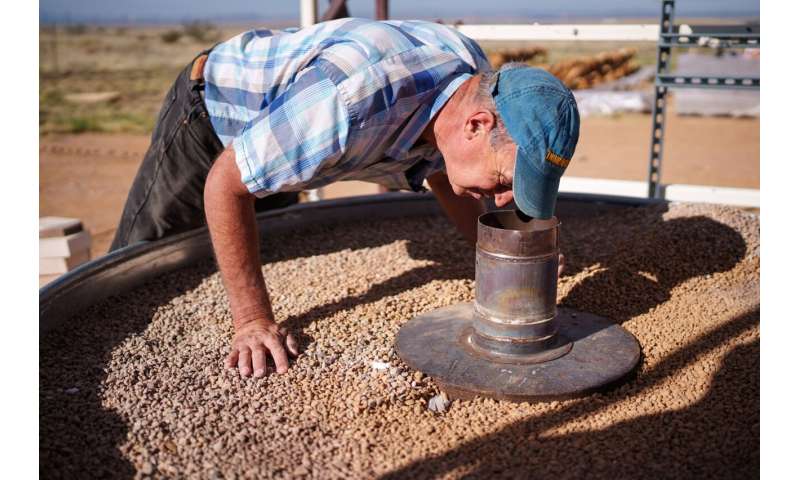Rocks may hold key to storing intermittent renewable energy, expanding its use

Sandia National Laboratories is collaborating with New Mexico-based CSolPower LLC to develop an affordable method of storing energy from renewable sources. The primary goal of the partnership is to transition to zero-carbon solar and wind energy for generating electricity.
"You need to have energy storage and dispatchable power when renewable energy is unavailable or when there's a large spike in demand from the grid," said Luke McLaughlin, a mechanical engineer at Sandia who works on thermal energy storage. "With this project, we're integrating renewable energy sources into an electrically charged thermal energy storage system. Our aim is to develop the technology and take it to a place where you can use wind and photovoltaic energy sources to charge the system."
The system consists of rocks held in a bed that can be heated or cooled with air to store thermal energy. "We've learned that gravel from landscaping companies can be successfully used for the system without requiring extensive washing or preparation," said Nathan Schroeder, a Sandia mechanical engineer.
Schroeder said Sandia designed a small 100-kilowatt-hour test rig to test the rock bed's performance at the National Solar Thermal Test Facility. Photovoltaic panels are being installed, and updates have been made to demonstrate the bed's ability to charge using an intermittent energy source.
"One of the advantages of thermal energy storage in rocks is that it can be built anywhere," said Walter Gerstle, who co-founded CSolPower in Albuquerque in 2019. "It can be commodified and doesn't require extensive permitting. We believe it can be implemented more quickly and economically than other approaches."
Cost is a crucial factor.
"Reducing the cost of this thermal energy storage system, or energy storage systems in general, increases the potential for deploying these systems in industry and it increases the likelihood of adopting renewable energy," Schroeder said.
Heating things up when the sun is down
CSolPower's technology focuses on long-duration energy storage, which means it can provide energy storage ranging from hours to months. During testing, the bed was charged with air at temperatures of 500°C, or greater than 900°F, and the system maintained that temperature for up to 20 hours.
"We successfully charged and discharged the system, and so far, the performance of the system is in line with our predictions and modeling," Schroeder said.
The technology offers a way to reduce dependence on fossil fuel heat sources.
"A natural approach is to store excess electricity generated during the day as heat, and then use it to heat water and homes at night. This is an example of the small-scale use of this storage option," Gerstle said.
Prototype testing will continue until June 2024.
"Our goal is to take this lab-scale project and prepare it for deployment in the marketplace," Schroeder said. While CSolPower aspires to make its technology ready for utility-scale storage, the company plans to start with small-scale implementation. If the current phase of testing is successful, several greenhouses in northern New Mexico are lined up to use the rock bed for thermal energy storage.
"Instead of curtailing solar energy production, we would store it and use it during cold nights to keep the greenhouses warm enough to grow plants year-round," Gerstle said.
Provided by Sandia National Laboratories